Imagine trying to lead a team into the future of tech, but every article you read feels like it’s written for PhDs. You know AI matters, but most learning paths just aren’t built for you.
Actually, learning AI as a not-entirely-technical leader is like learning how to drive a car: You don’t need to know how to build the engine. But you do need to understand the controls, know what each dashboard light means, and recognize when to bring in a mechanic.
That’s what this guide is for. We’ll walk you through a clear, beginner-friendly path to understanding AI from the ground up. If you want help implementing what you’ve learned from this article, Aloa is your strategic partner for AI development and education. We help companies translate AI from abstract concepts to working solutions, even if no one on your team has an AI background.
Let’s dive in!
What is Artificial Intelligence?
Think of AI like a highly skilled specialist who never sleeps, and it can analyze data, recognize patterns, and make micro-decisions faster than any human. That’s the core of Artificial Intelligence. In simple terms, AI involves teaching machines to learn from data, solve problems, and make decisions, just like humans can.
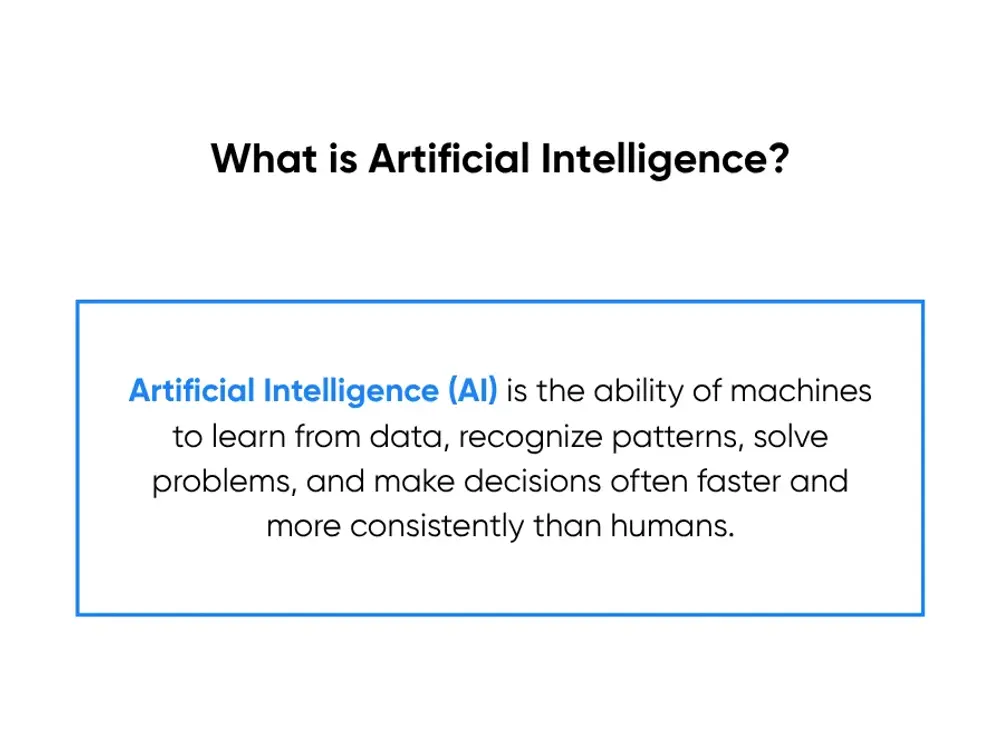
Can AI replace people? Not exactly. It augments human decision-making. It’s most powerful when paired with your industry knowledge, intuition, and strategic judgment. In other words, AI is the engine, but humans are still driving the car.
AI applications are expanding rapidly, significantly impacting various fields in our daily lives:
- Healthcare uses it for faster diagnostics.
- Logistics uses it to plan routes and optimize delivery.
- Retailers use it to personalize recommendations and forecast demand.
We’ll explore some essential AI skills that will help you utilize AI for your own business in the next section.
Essential Skills for Learning AI
You don’t need to have a PhD to get started, but there are a few foundational skills that will make learning AI easier. These skills will help you understand how AI works and how to apply it to your specific needs:
- Python (basic literacy): While you may never write Python code, understanding what it looks like and what it does will help you follow demos and experiment with prompts much faster.
- Math & Stats (basic literacy): AI concepts are easier to understand if you have a basic grasp of probabilities, averages, and correlations.
- Popular Tools: Tools like TensorFlow and PyTorch power many AI solutions — not something you need to master, but it is helpful to understand their basic functionalities.
- A Growth Mindset: The most important skill? Be adaptable to new ways of thinking. AI is changing every day, and having a learning-oriented mindset will pay off over time.

For executive leaders, learning AI isn’t about becoming an AI thought leader or a data analyst. It’s about building breadth over depth. You want to understand the landscape, the language, and the levers that matter so you can lead your team and make informed decisions.
With the right mindset, online courses from Coursera, DataCamp, or Google AI are a smart, low-friction way to build your knowledge, and we’ll explore those in the next section. But if you want to move from learning to doing, Aloa can help bridge the gap. We offer free AI consultations, tailored training, and embedded experts to turn education into execution.
Beginner AI Courses and Resources
Once you've explored the big picture, you may want to take your research one step further. Structured courses can help fill in the gaps, giving you the language, frameworks, and confidence to talk AI with your team, partners, or investors.
Here are trusted platforms that will walk you through the basics:
- Coursera: Offers introductory AI courses from institutions like Stanford University and DeepLearning.AI. Courses like "AI For Everyone" by Andrew Ng are perfect for non-technical audiences.
- Google AI: Features free lessons, tutorials, and tools designed for beginners and professionals alike. The curriculum is accessible and practical.
- DataCamp: Offers interactive, Python-based courses that combine theory with hands-on practice.
- Microsoft’s AI for Beginners Curriculum: A GitHub-hosted course that teaches fundamentals of machine learning, data science, and responsible AI. Great for self-paced learners.
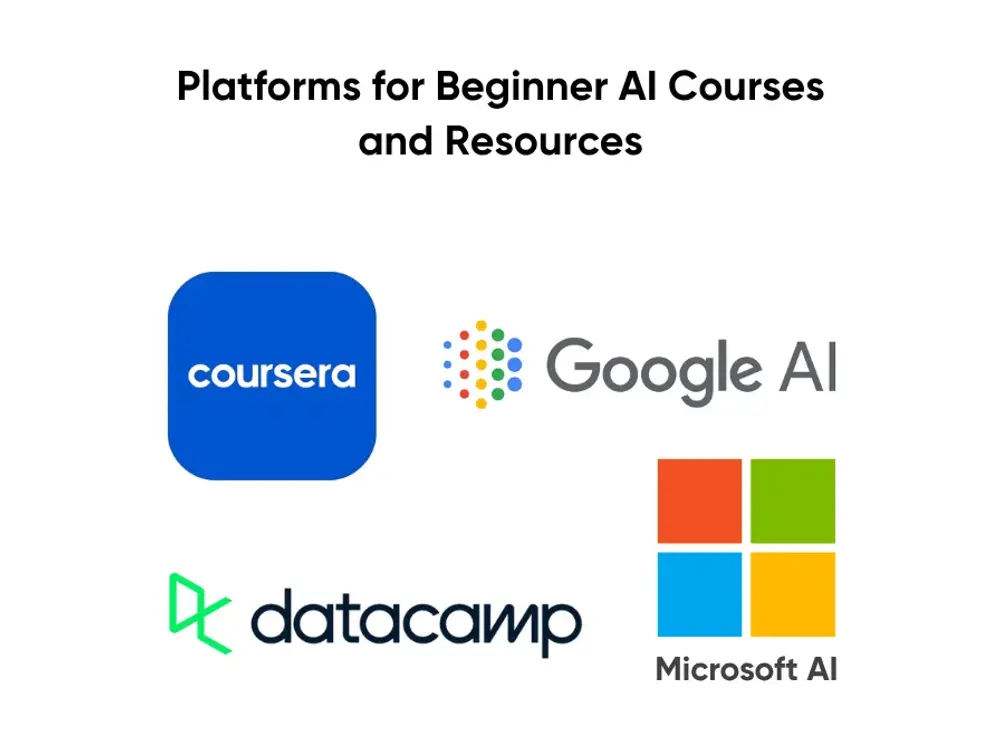
While it's not absolutely necessary for executive leaders to take a formal AI course, doing so can help you lead with significantly more confidence and communicate more effectively.
Advancing AI Knowledge to Executive Level
Once you’ve learned the basics, it’s time to shift from student to leader.
Executive-level AI knowledge means understanding how AI fits into your company’s broader strategy. It’s about spotting high-impact opportunities, asking the right questions in product and hiring discussions, and knowing enough to evaluate risk and ROI. You don’t need to write code, but you do need to know what’s possible, what’s hype, and how to lead your team through smart, ethical adoption.
Here’s how to level up:
- Strategy Courses: Platforms like edX and Google AI Essentials offer programs on building AI teams, evaluating vendors, and measuring outcomes.
- Follow the Right Thinkers: Subscribe to newsletters like Byte-Sized, and get roundups of AI trends, tools, and insights for tech-forward leaders.
- Create an Internal AI Roadmap: Define problems AI can help solve. Sketch out what data you already have. Identify gaps.
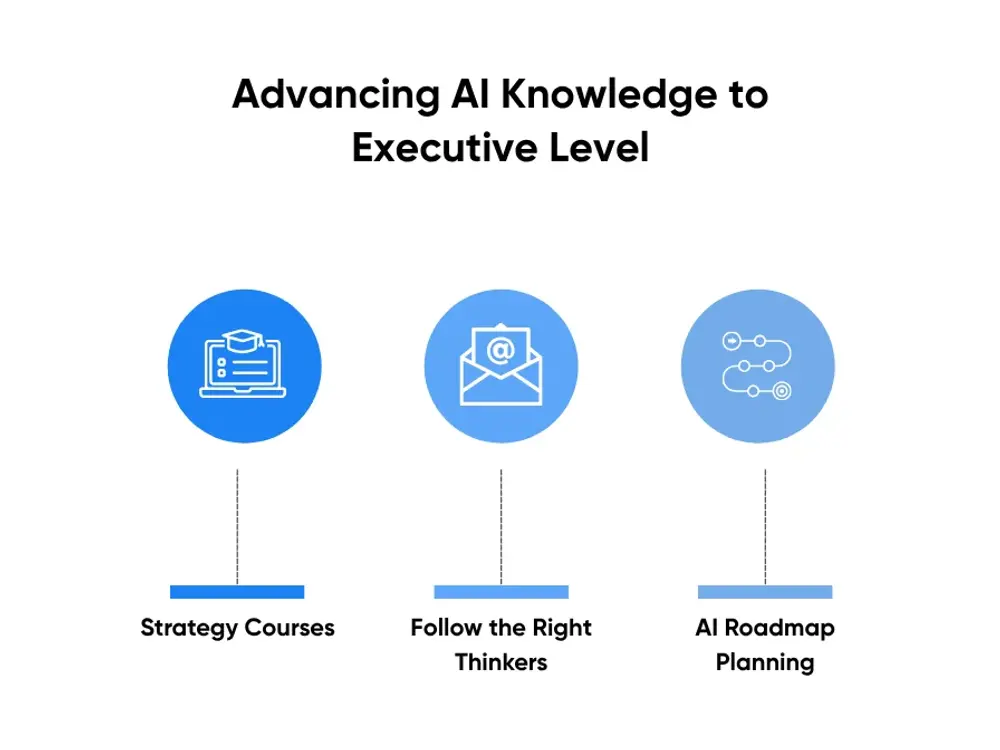
As a non-technical executive, your next step is learning how to spot the right opportunities, ask sharper questions, and align your team around smart adoption. That foundational understanding will help you avoid hype, prioritize ROI, and ultimately hire or partner with the right AI talent. Aloa supports this journey by helping leaders build practical knowledge and apply it directly through hands-on strategy and execution.
Practical Applications and Projects
You can’t learn AI without applying it. Projects allow you to move from passive learner to active problem-solver. Here are a few accessible ways to experiment:
- Build a Product Recommendation Engine: Use purchase history to recommend items to users, like Amazon or Netflix.
- Create a Chatbot: Use tools like Dialogflow or GPT APIs to build a bot that answers FAQs or collects leads.
- Forecast Sales with Regression Models: Use historical data to predict future revenue. Bonus: your CFO will love this.
- Analyze Customer Feedback: Use natural language processing (NLP) to understand sentiment in survey results.
If this still feels overwhelming, you’re not alone. Start small by experimenting with GPT-based chatbots. For example, feed GPT a set of customer support transcripts and try prompts like: “Summarize the top 3 customer pain points in this text,” or “Based on these FAQs, generate a chatbot script for responding to refund questions.” This helps you get high-quality, task-specific outputs with minimal setup.
Once you have a strong draft or response from GPT, you can turn it into a simple chatbot flow. Use a tool like Typeform or Intercom to plug in GPT’s responses, and set up basic logic paths (like routing refund questions to the right answer). If you need help setting this up or figuring out where to start, reach out to Aloa for a free consultation.
AI Career Opportunities
Even if you're not looking to switch careers, understanding the AI job landscape is a must-have for executive leaders. It helps you understand the talent that powers AI initiatives so you can design a modern team.
Here are a few key roles to know:
- ML Engineers: Build and deploy machine learning models.
- AI Product Managers: Define use cases, manage execution, and align AI capabilities with business goals — a role many non-technical founders naturally grow into.
- Data Analysts & Scientists: Clean, interpret, and translate data into insights that drive business outcomes.
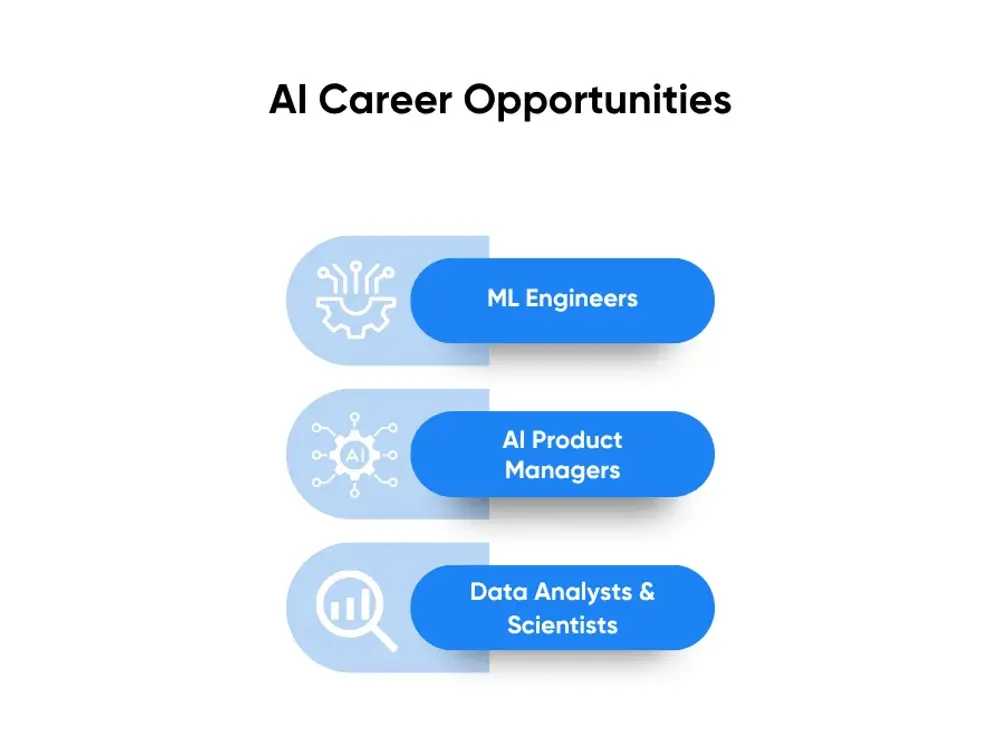
Understanding how these roles align leads to more informed hiring, clearer delegation, and more efficient business operations. Companies like Aloa can not only help you staff fractional AI talent, but also advise on when to outsource versus build in-house. Making the right call here can accelerate your timeline and reduce costly missteps.
Community and Support Networks
Learning AI is a long-term journey, and having a support system makes all the difference:
- Aloa AI Academy: Our community helps startup leaders and non-technical professionals accelerate their AI journey. We offer live sessions, office hours, and Slack support.
- Reddit r/artificial: Great for news, inspiration, and community feedback.
- Slack & Discord Groups: Many courses (like DataCamp and Google AI) include access to active learner communities.
These spaces provide real-time help, motivation, and networking opportunities. You’ll stay accountable and connected to the latest developments.
Key Takeaways
Learning how to learn AI is one of the most valuable decisions you can make as a startup leader. You don’t need to be technical, but you need the right roadmap and a willingness to learn.
Start with the basics. Build confidence through hands-on examples. And scale your understanding consistently.
When you’re ready to bring AI into your product, process, or team, Aloa is here to help you build, launch, and lead. With tailored education, strategy consulting, and custom development, you’ll be able to lead our company into the AI future.
Want ongoing AI insights in bite-sized form? Subscribe to Aloa’s newsletter, Byte-Sized, for quick, actionable reads to keep you sharp on AI, tech, and leadership.
FAQs
What is the first step to learning AI?
Start by thinking about what you want to achieve. Your goals will determine the depth and breadth of your AI learning journey. For most startup leaders, that means understanding key terms, grasping how models work, and knowing when to pull in experts. Courses like Google AI Essentials or AI for Everyone are great entry points for building that foundation.
How long does it take to learn AI?
It depends on your career goals and the type of role you're aiming to support. Most executives can grasp the fundamentals of AI and its impact on daily tasks within a few weeks, especially with a clear learning plan. From there, you can build confidence by experimenting with tools and concepts over 3–6 months — enough to engage with teams, data scientists, and vendors meaningfully.
What skills are needed for AI?
Learning the basics of AI often start with the principles of python, math, and statistics. A working knowledge of tools like TensorFlow or PyTorch would be a plus. For executives, understanding computer systems, how raw data becomes useful insight, and how to apply this revolutionary technology in a business context is even more critical than deep technical expertise.
Do I need a computer science degree to learn AI?
Not at all. Many successful AI practitioners come from fields like economics, business, or psychology. The key is curiosity and consistency.
What’s the difference between AI, machine learning, and deep learning?
Artificial Intelligence (AI) is a broad field focused on building systems that can mimic human intelligence. Machine learning is a subset of machine learning (yes, a subset within AI) that trains models to learn from raw data and improve over time. Deep learning, used in some of the most advanced AI applications like image recognition and reinforcement learning, is a specialized form of machine learning based on neural networks that solves complex problems through layered data analysis and structures.
Can non-technical people build AI projects?
Yes. Today’s no-code and low-code platforms, such as ChatGPT, Zapier, and Runway, enable non-technical leaders to build practical projects using AI without needing to master a programming language. In a rapidly evolving field like AI, these tools help solve complex problems by simplifying data structures, automating data analysis, and enabling experimentation. Partners like Aloa can help you bring those ideas to life and guide you toward the right level of mastery for your business.
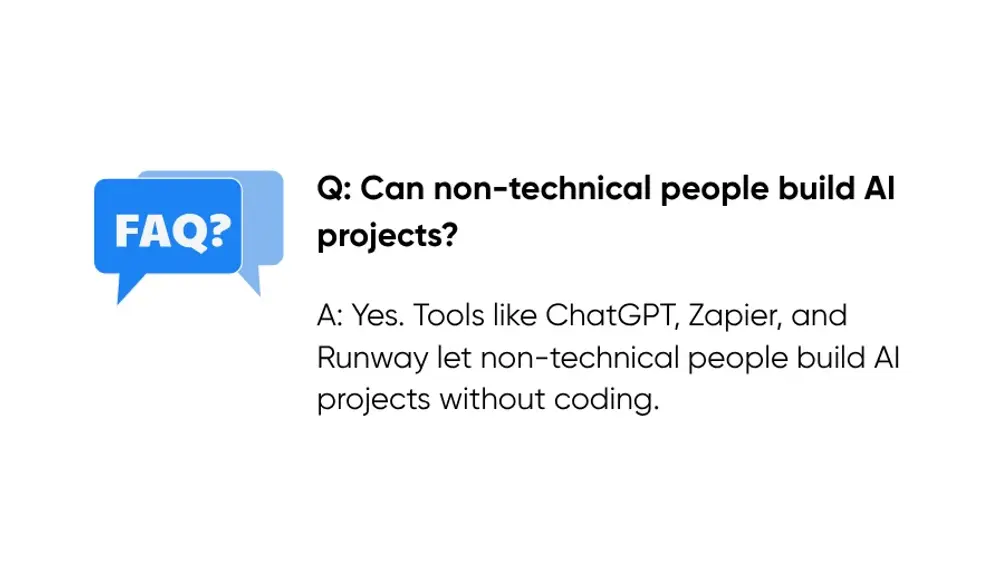
How do I apply AI in my startup?
Start by identifying workflows or daily tasks that involve large amounts of raw data or repetitive logic. Then explore how algorithms or no-code platforms could automate, optimize, or enhance those areas. Aloa has helped many startups reduce inefficiency in business operations by building custom AI applications.
What if I don’t have time to learn AI deeply?
You don’t need to master algorithms or a new programming language. Learn the fundamentals of AI just enough to guide decisions and spot strategic use cases, then rely on expert teams like Aloa to fill in the specialization or technical build.
Are there ethical risks with using AI?
Absolutely. The most advanced AI applications can raise concerns around bias, privacy, and misinformation, especially when working with raw data or automated decision-making. A strong AI project includes ethics-focused project management, transparent workflows, clear data safeguards, and adherence to LMS (learning management system) standards if you're training or deploying widely.

